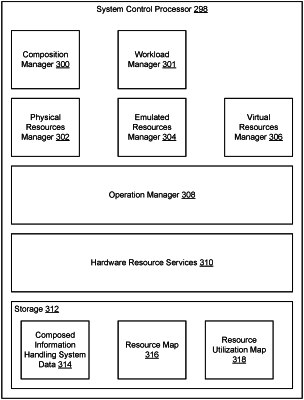| CPC G06F 9/505 (2013.01) [G06F 9/5038 (2013.01)] | 17 Claims |

|
1. A system control processor manager for servicing workloads using composed information handling systems instantiated using information handling systems, comprising:
persistent storage; and
a workload manager programmed to:
obtain a workload request for a workload of the workloads;
predict future resource needs for the workload during a future time period;
make a determination that a portion of free resources of the information handling systems are available to meet the future resource needs;
reserve the portion of the free resources based on the determination to obtain reserved resources during the future time period;
compose a composed information handling system of the composed information handling systems using the reserved resources during the future time period to service the workload request;
obtain a second workload request for a second workload of the workloads;
predict second future resource needs for the second workload during a second future time period;
activating a reservation system in response to determining that the future resource needs exceeds a threshold value, wherein the reservation system limits an ability of resources to be reserved;
make a second determination, using the reservation system, that an insufficient quantity of the free resources of the information handling systems are available to meet the future resource needs;
in response to the second determination:
make a third determination, using the reservation system, that second reserved resources can be freed to meet the future resource needs;
free the second reserved resources based on the third determination and reserve the freed second reserved resources to obtain third reserved resources; and
compose a second composed information handling system of the composed information handling systems using the third reserved resources during the second future time period to service the second workload request.
|